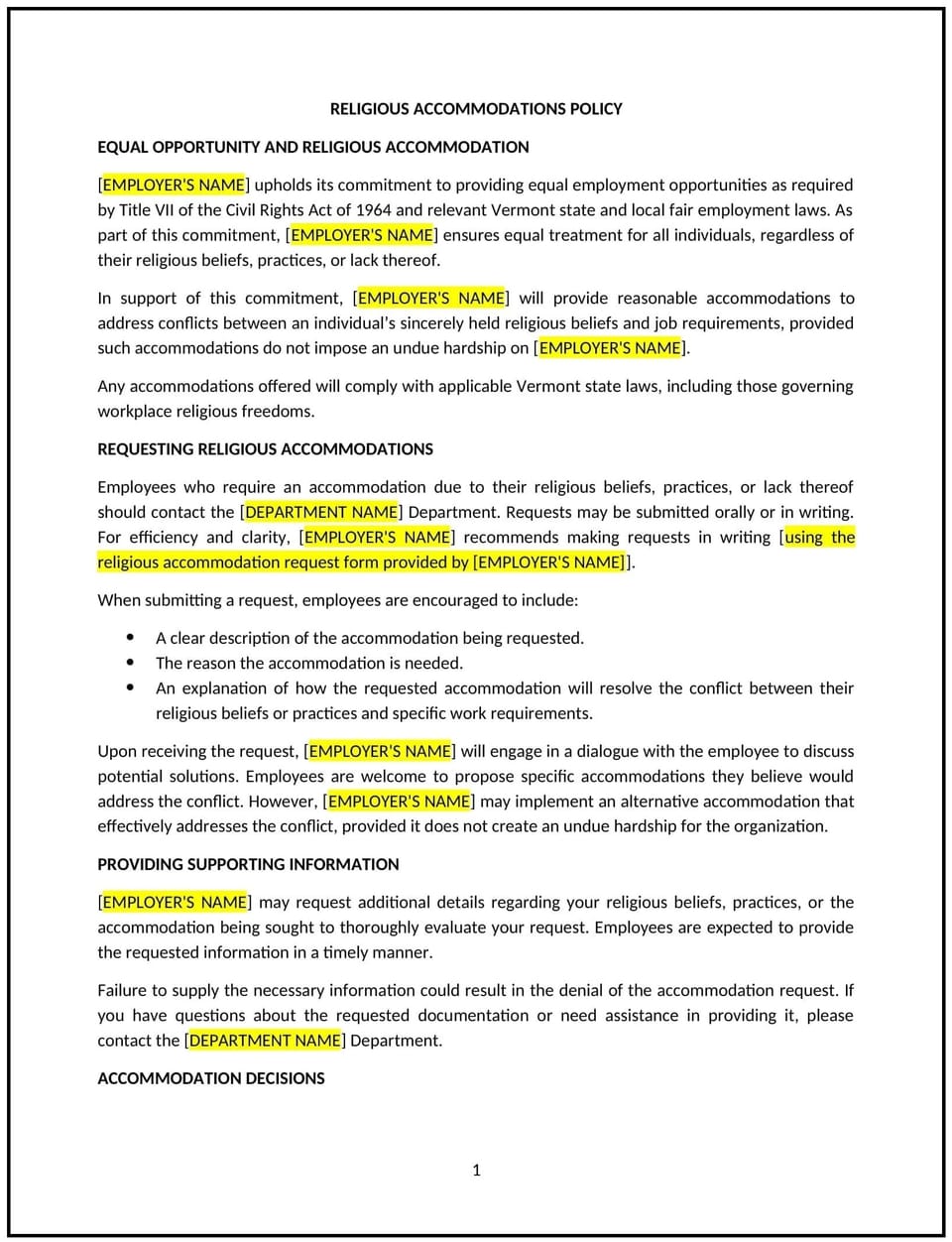Religious accommodations policy (Vermont): Free template

Religious accommodations policy (Vermont)
This religious accommodations policy is designed to help Vermont businesses support employees' religious practices and beliefs while maintaining compliance with state and federal anti-discrimination laws. It provides guidelines for requesting and implementing reasonable accommodations in the workplace.
By adopting this policy, businesses can foster inclusivity, respect diverse beliefs, and promote workplace harmony.
How to use this religious accommodations policy (Vermont)
- Define religious accommodations: Specify what constitutes an accommodation, such as schedule adjustments, dress code exceptions, or space for religious observance.
- Include request procedures: Outline the steps for employees to request accommodations, including submitting written requests to HR or management.
- Address evaluation criteria: Detail how requests will be reviewed, focusing on reasonableness and the impact on business operations.
- Emphasize anti-discrimination: Reinforce the company’s commitment to preventing discrimination or retaliation based on religion or accommodation requests.
- Monitor compliance: Regularly review workplace practices to align with Vermont and federal laws, including Title VII of the Civil Rights Act.
- Promote open communication: Encourage employees and managers to engage in collaborative discussions to identify feasible accommodations.
- Document accommodations: Maintain records of requests, evaluations, and outcomes for transparency and accountability.
Benefits of using this religious accommodations policy (Vermont)
This policy provides several benefits for Vermont businesses:
- Enhances inclusivity: Supports a diverse workforce by respecting religious practices and beliefs.
- Promotes compliance: Aligns with Vermont and federal anti-discrimination laws, reducing legal risks.
- Builds trust: Demonstrates the company’s commitment to employee rights and fair treatment.
- Reduces conflicts: Provides clear guidelines for handling accommodation requests, minimizing misunderstandings.
- Strengthens workplace morale: Fosters a culture of respect and mutual understanding.
Tips for using this religious accommodations policy (Vermont)
- Communicate the policy: Share the policy with employees during onboarding and include it in the employee handbook or internal systems.
- Provide training: Educate managers and HR staff on evaluating accommodation requests and preventing religious discrimination.
- Encourage proactive discussions: Promote open conversations between employees and managers to address accommodation needs early.
- Maintain confidentiality: Ensure that all accommodation requests and related discussions are handled with discretion.
- Update regularly: Revise the policy to reflect changes in Vermont laws, workplace practices, or employee feedback.
Q: What types of accommodations are typically provided under this policy?
A: Common accommodations include flexible scheduling for religious observances, exceptions to dress codes, and providing a quiet space for prayer or meditation.
Q: How should businesses evaluate accommodation requests?
A: Requests should be reviewed based on reasonableness, feasibility, and the potential impact on business operations, as outlined in this policy.
Q: Can businesses deny a request for religious accommodations?
A: Requests can be denied if they pose an undue hardship, such as significant operational disruptions or excessive costs, but must be documented and explained clearly.
Q: How should employees submit accommodation requests?
A: Employees should submit written requests to HR or their manager, detailing the nature of the accommodation and its connection to their religious beliefs.
Q: Are employees protected from retaliation for requesting accommodations?
A: Yes, Vermont law and federal regulations prohibit retaliation against employees who request or use religious accommodations.
Q: How should businesses handle conflicts arising from accommodations?
A: Conflicts should be addressed through open dialogue, mediation, and reference to the policy’s guidelines for fair and respectful resolution.
Q: How often should this policy be reviewed?
A: This policy should be reviewed annually or whenever significant changes occur in Vermont or federal anti-discrimination laws.
Q: Does this policy apply to contractors or temporary employees?
A: Yes, the policy applies to all workers, including contractors and temporary employees, to ensure consistent support for religious practices.
This article contains general legal information and does not contain legal advice. Cobrief is not a law firm or a substitute for an attorney or law firm. The law is complex and changes often. For legal advice, please ask a lawyer.


